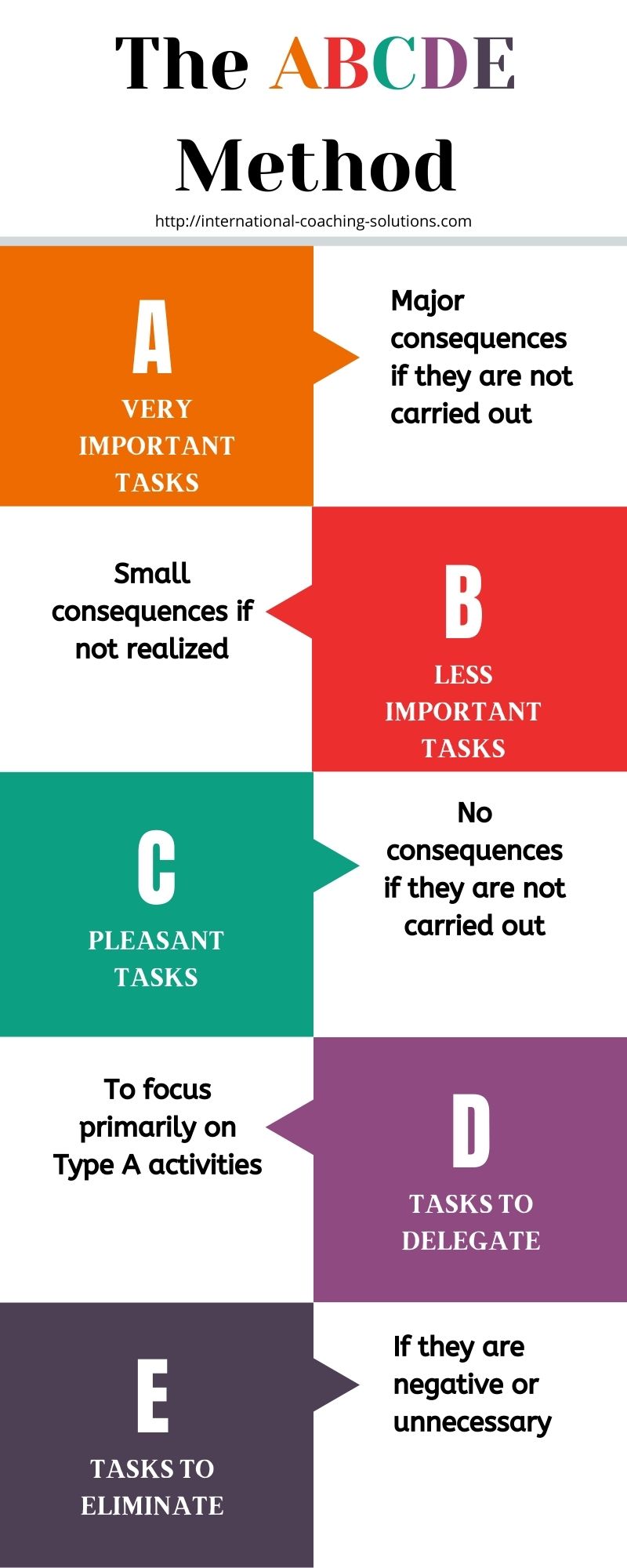
The ABCDE method to better define your priorities
The ABCDE method was invented by Bryan Tracy and is a complementary tool to the Eisenhower Matrix that allows you to better prioritize your tasks and improve your time management.
I will present the tool with its qualities and weaknesses.
Type A tasks
These are the activities that you must do at all costs because they are the ones that help you achieve your most important goals.
If you do not give these activities the right importance, they will have a negative impact on your personal or professional life.
If you have several important activities, you can name them as follows: A1, A2, A3, A4, A5, etc.
Thus, the type A activities are the ones that must be done at all costs.
If you have a tendency to procrastinate on doing a type A activity, you need to figure out what is slowing you down.
It may be an unpleasant or difficult task or excessive perfectionism.
If you are having trouble defining your most important tasks, I suggest you read my article on how to prioritize your tasks.
Type B activities
According to the author of this method, these are activities that you can do if you have completed all of the Type A activities.
These activities are less important and have a low impact on your life and often on the lives of others.
Some of the Type B activities are commitments you decide to make to other people.
But these activities still need to be done because if you don’t do them they can become urgent or have a negative impact on your work and personal relationships.
Type C activities
These are activities that do not affect your life if you do not do them right away.
Instead, they are activities that are important to your well-being or tasks that you enjoy doing.
According to Bryan Tracy, you should not pursue a Type C task before an A or B task.
I personally disagree with this viewpoint, because some people may choose to perform a C task instead of an A or B task because it has a positive effect on their well-being and motivation.
Type D tasks
These are activities that you can delegate to another person. The purpose of delegation is to save time so that you can focus more on Type A tasks.
According to the author, you should delegate as much as possible.
I agree with this principle, although some people may delegate too quickly and to the wrong people.
To find out how to delegate properly, I recommend reading my article on how to learn to delegate.
Some people have difficulty delegating because they are too perfectionists and are convinced that they are the only ones who can do a good job.
If you recognize yourself in this category, I recommend reading my article on how to manage perfectionism.
Type E Activities
Finally, there are the activities that you should eliminate because they are unnecessary.
While I agree with the principle, sometimes there are activities that are not goal-related, but help meet a psychological need that is important to an individual.
Eliminating these activities may not be the best choice.
Instead, these activities could be reduced in duration and scheduled at specific times of the day so that they do not negatively affect priority activities.
Activities to eliminate are those that have a negative effect on your well-being and motivation.
Conclusion on Brian Tracy’s ABCDE method
The ABCDE method is an alternative to the Eisenhower Matrix for defining your priorities both professionally and personally.
However, like any other tool, it has limitations.
For example, it assumes that the person using it has a clear vision of their priorities, but this is not always the case.
As a result, the individual will need to be coached by a life coach to define his or her values and needs in order to identify Type A activities.
The same needs can be found in Type B, C, D, and E activities.
For example, one person might feel the need to help others (B) by setting aside her priorities.
Another individual might prioritize a meal with a friend (C) and set aside important tasks.
Still, another might decide not to delegate anything (D) and not focus on an A task.
Finally, another individual might prioritize his or her need to relax (E) instead of immediately attending to what is important.
The ABCDE model also does not take into account other factors related to :
- the individual, such as self-esteem, self-confidence, perfectionism
- the interaction with others, such as the fear of judgment of others, the fear of taking action, the stress
If you are interested in the topic of productivity, I invite you to discover all my articles on productivity.
If you are looking for tools to improve your time management skills, I recommend you read my article on the best time management apps.
To learn more about how to improve your productivity and well-being, you can take advantage of a free session with an experienced time management coach.
If you want to learn how to manage your time, I invite you to find out more about our online time management course.
You can write to us using our contact form, call us at +33 6 69 46 03 79 or contact us on WhatsApp at +33 6 69 46 03 79.
If you are ready to take action, check out our life coaching packages:
- one month life coaching package
- 3-month life coaching package
- 6-month life coaching package
- 1-year life coaching package
Read this article in other languages
Français : La méthode ABCDE une alternative à la matrice d’Eisenhower
Italiano: Il metodo ABCDE: un’alternativa alla matrice di Eisenhower

